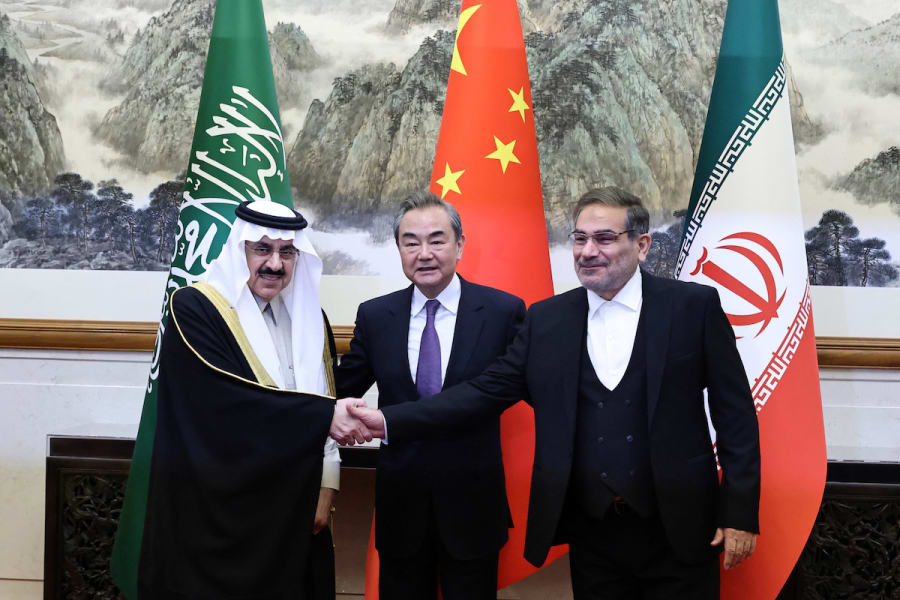Is renewed diplomacy between Iran and Saudi Arabia good for Israel?

It wasn’t too long ago that Saudi Arabia was considering cozying up to Israel in an attempt to coalesce and join forces towards their common enemy Iran, which was seen as a great threat to both countries.
Suddenly, that threat has disintegrated, into the desert winds, as Saudi Arabia proudly declared renewed diplomatic relations with the country they feared so much. Not only was this surprising, given the real danger Iran posed to them, but it had been expected that there would be the dawning of a new age, ushering peace and mutual cooperation between Israel and Saudi Arabia following the success of the Abraham Accords.
Clearly, the alliance with Iran puts a damper on any proposed warming that the Saudis would make with Israel. But is the present unstable atmosphere, brought on by the nearly daily protests of the Netanyahu government, responsible for a missed opportunity?
If you listen to former Prime Minister Naftali Bennett, it is. His comment was, “Countries in the world and region see Israel divided with a non-functional government, focused on serial self-destruction. And then those countries chose a side.”
What apparently was unknown to many is that over the past year, while Israel was embroiled in multiple elections, negotiations had been taking place between Iran and Saudi Arabia, facilitated with the help of China, instead of the United States. That threesome might be responsible for a new feeling of empowerment by Saudi Arabia, who could think of itself more as an equal player rather than a protectorate of the more powerful U.S. and militarily superior Israel.
So while the Americans have been downplaying China’s role in brokering the agreement, since they clearly were not asked to the party, everyone is trying to put an optimistic slant on this newfound relationship.
One example of this can be seen in comments made by University Al-Saif in Kuwait, which stated, “This shouldn’t be a zero-sum game for the U.S. It can serve U.S. interests: Iran nuclear deal, Yemen, Lebanon for starters. China’s gain doesn’t have to mean a loss for the U.S.”
U.S. National Security Council Spokesperson John Kirby, jumping on the cheery bandwagon said, “We support any effort to de-escalate tensions in the region. We think it’s in our interests.”
Of course, no one is talking about what China has to gain from it all. Saudi Arabia is just another arrow in its quiver as it gains leverage in the area and supplants the once ever-present U.S. superpower, which typically brokered such agreements while they sought to promote peace, especially among Middle East nations.
But what happens to Israel, which now finds itself alone with few partners willing to back its interests? Will partners continue to view Israel as a formidable challenger who has always been ready to take on any and all enemies who seek to destroy its presence in this part of the world? Will Israel end up standing alone because the U.S. has become too timid to take on China and is okay with sharing the peace-keeping stage with their new rival?
What about Russia? China has been cozying up to Putin, as well. As ties have deepened between the two in recent days, there is a plan to institute bilateral trade, a move which will greatly assist them against U.S. sanctions, which have sought to hurt them. But this is not surprising since China has made no secret of their support for Russia in their fight against Ukraine.
In fact, according to the White House, “there are indications that China is contemplating supplying Russia with weapons.”
Pivot to Russia, which has likely expected some support from Israel since there has been cooperation between the two countries for a while on a variety of issues. Consequently, Israel has tried to do its best to stay out of the fray for a number of reasons.
Although Israel had been approached by the U.S. to provide weapons to Ukraine, it refused, in a daring move considering the extraordinary amount of financial assistance it receives from its greatest ally. The most they would do was to offer humanitarian support where needed. Again, this was, in large part, not to hurt close ties between Russia and Israel. Yet, according to an article that appeared in Tablet Magazine one year ago, they believe that, at some point, Russia could intimidate Israel.
Russia and Israel together have worked in cooperation as it involves Syria, and part of that has involved being able to fly over Syrian skies against Iranian military targets. “An emboldened Iran seems likely to try to further grow its military presence near Israel’s borders, raising the stakes in Syria, Lebanon and Gaza.”
So when you add everything together – Iran, Saudi Arabia, China and Russia, it doesn’t seem too promising that those players, with all their many converging common interests, would end up being a good thing for Israel.
According to Politico, news of the Iran-Saudi pact “dealt a symbolic blow to Israeli Prime Minister Benjamin Netanyahu who has made the threat posed by Tehran a public diplomacy priority and personal crusade.”
And with good reason! It undermines all the hard work which was achieved in 2020 when Israel and the U.S. were able to normalize relations with Bahrain and the United Arab Emirates, among others in the region, all in an effort to delegitimize and isolate Iran.
An Israel-Saudi deal would have been a great feather in Netanyahu’s cap, but now that won’t happen. So, this “diplomatic win for Iran is very bad news for Israel.”
If this agreement does yield success, Israel could ironically find itself isolated and delegitimized from its neighbors, rather than forging new relationships with old enemies, thus causing Iran to be odd man out.
While it’s too early to tell what will happen, one thing is for sure: A simmering stew – whose ingredients include Iran, Saudi Arabia, China and Russia – can’t possibly leave a good taste in anyone’s mouth!

A former Jerusalem elementary and middle-school principal who made Aliyah in 1993 and became a member of Kibbutz Reim but now lives in the center of the country with her husband. She is the author of Mistake-Proof Parenting, based on the principles from the book of Proverbs - available on Amazon.














